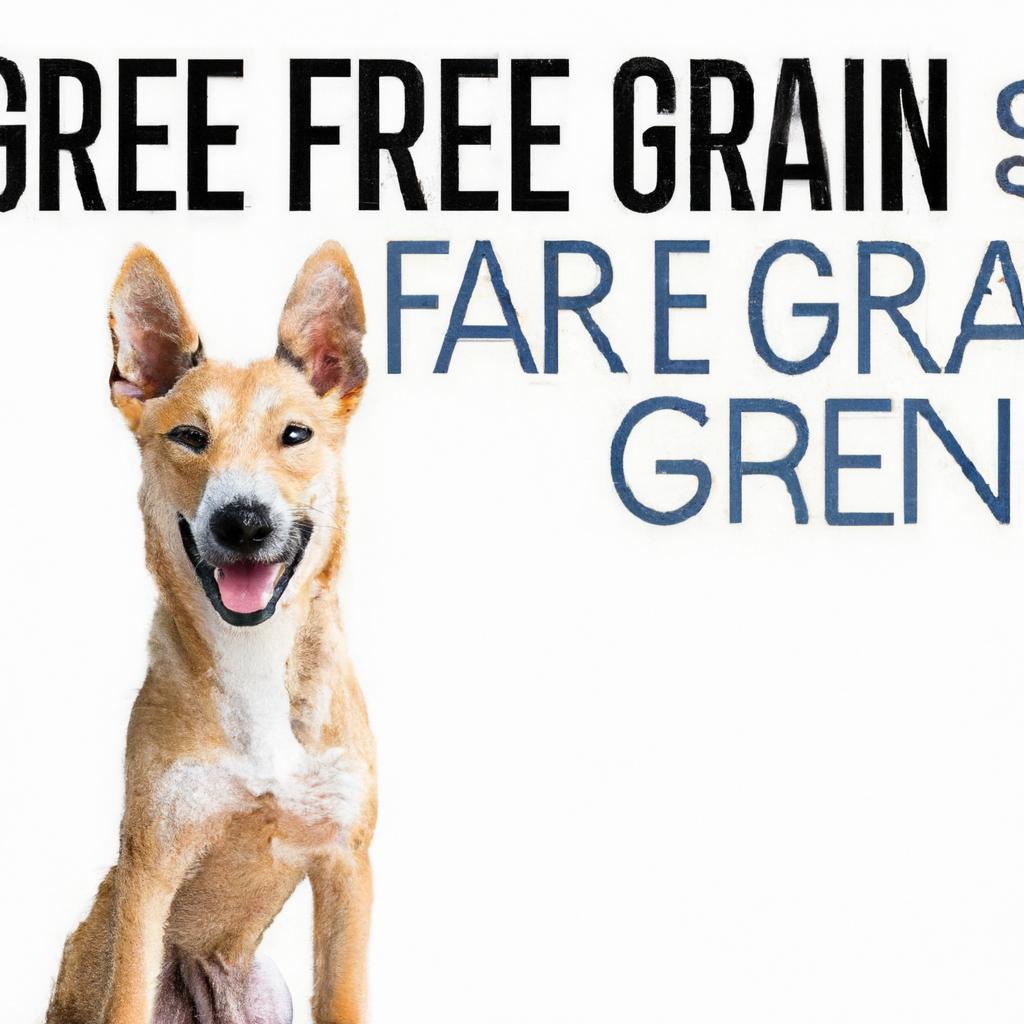In a bustling Reddit thread, a concerned dog owner shared her experience with her beloved Golden Retriever, Max, who had been struggling with allergies and digestive issues. After switching to grain-free dog food, she noticed a remarkable improvement in his energy and coat health. As fellow pet lovers chimed in, many vets weighed in, highlighting the importance of individual dietary needs. They emphasized that while grain-free diets can benefit some dogs, it’s crucial to consult a veterinarian for tailored advice. Your furry friend deserves the best—let’s make informed choices together!
Contents
- Understanding the Nutritional Needs of Dogs in Relation to Grain-Free Diets
- Evaluating the Potential Health Risks Associated with Grain-Free Dog Food
- Expert Opinions: What Veterinarians Are Saying About Grain-Free Options
- Making Informed Choices: Recommendations for Dog Owners Considering Grain-Free Diets
- Q&A
Understanding the Nutritional Needs of Dogs in Relation to Grain-Free Diets
When considering a grain-free diet for dogs, it is essential to understand their unique nutritional requirements. Dogs are omnivores by nature, which means they can thrive on a variety of food sources, including both animal and plant-based ingredients. However, the absence of grains in their diet raises questions about whether they are receiving all the necessary nutrients. A well-balanced diet should include:
- Proteins: Essential for muscle development and overall health, proteins should come from high-quality animal sources.
- Fats: Healthy fats are crucial for energy and maintaining a shiny coat. Omega-3 and Omega-6 fatty acids are particularly beneficial.
- Vitamins and Minerals: These micronutrients support various bodily functions, including immune response and bone health.
- Fiber: While grains are a common source of fiber, alternative sources like sweet potatoes and peas can provide similar benefits for digestion.
It is important to note that not all grain-free diets are created equal. Some formulations may rely heavily on potatoes or legumes, which can lead to an imbalance in nutrient profiles. Therefore, when selecting a grain-free dog food, pet owners should look for products that offer a diverse range of ingredients to ensure their dogs receive a complete and balanced diet. Ingredients such as:
- Animal proteins: Chicken, beef, or fish should be the primary ingredient.
- Vegetables: Carrots, spinach, and other vegetables can provide essential vitamins and minerals.
- Healthy fats: Sources like fish oil or flaxseed oil can enhance the nutritional value.
Consulting with a veterinarian is crucial when transitioning to a grain-free diet. Vets can provide personalized recommendations based on a dog’s specific health needs, age, and activity level. They can also help monitor for any adverse reactions, such as allergies or digestive issues, that may arise from dietary changes. Regular check-ups can ensure that your dog is thriving on their new diet and receiving all the necessary nutrients.
Ultimately, the decision to switch to a grain-free diet should be informed by thorough research and professional guidance. While some dogs may benefit from grain-free options, others may do just as well on traditional diets that include grains. Understanding your dog’s individual needs and preferences is key to making the best dietary choice for their health and well-being.
Evaluating the Potential Health Risks Associated with Grain-Free Dog Food
When considering a shift to grain-free dog food, it is crucial to evaluate the potential health risks that may accompany this dietary choice. While many pet owners are drawn to grain-free options due to perceived benefits, such as improved digestion and increased energy levels, there are significant concerns that warrant careful consideration. Recent studies have suggested a possible link between grain-free diets and certain health issues, particularly those related to heart health.
One of the most alarming risks associated with grain-free dog food is the potential development of canine dilated cardiomyopathy (DCM). This serious heart condition has been observed in dogs consuming diets high in certain ingredients, particularly those rich in peas, lentils, and potatoes. Vets have raised concerns that these ingredients, often found in grain-free formulations, may not provide the necessary nutrients that support heart health. As a result, pet owners should be vigilant and consult with their veterinarians before making any dietary changes.
Moreover, grain-free diets can sometimes lead to nutritional imbalances. Many grain-free products are formulated with alternative carbohydrate sources that may lack essential vitamins and minerals. This can result in deficiencies that could adversely affect a dog’s overall health, including their immune system and skin condition. It is essential to ensure that any diet, grain-free or not, meets the complete nutritional requirements of your pet.
Lastly, the long-term effects of grain-free diets are still not fully understood. While some dogs may thrive on these diets, others may experience adverse reactions over time. Regular veterinary check-ups and monitoring are vital to assess your dog’s health and nutritional status. Engaging in open discussions with your vet can provide insights tailored to your dog’s specific needs, ensuring that any dietary choices made are in their best interest.
Expert Opinions: What Veterinarians Are Saying About Grain-Free Options
Veterinarians are increasingly weighing in on the debate surrounding grain-free dog food, particularly in online forums like Reddit. Many professionals express concern about the potential health implications of these diets, especially regarding heart health. **Veterinary cardiologists** have noted a rise in cases of dilated cardiomyopathy (DCM) linked to certain grain-free formulations, particularly those high in peas, lentils, and potatoes. This has led to a cautious approach among vets when discussing grain-free options with pet owners.
Moreover, some veterinarians argue that grains can be a beneficial part of a balanced diet for dogs. They emphasize that grains like brown rice, oats, and barley provide essential nutrients and fiber that can aid in digestion and overall health. **Veterinary nutritionists** often recommend a diet that includes grains, asserting that they can help maintain a healthy weight and support energy levels. This perspective highlights the importance of a well-rounded diet tailored to the individual dog’s needs rather than a one-size-fits-all approach.
On the other hand, there are veterinarians who support grain-free diets for specific cases, such as dogs with food allergies or sensitivities. They point out that some dogs may thrive on grain-free options, particularly if they have shown adverse reactions to grains in the past. **Veterinary professionals** stress the importance of consulting with a veterinarian before making any significant dietary changes, as they can provide personalized recommendations based on a dog’s health history and lifestyle.
Ultimately, the consensus among veterinarians is that pet owners should prioritize quality and balance in their dog’s diet. Many recommend looking for **AAFCO-approved** grain-free options that meet nutritional standards, ensuring that the food is complete and balanced. As the conversation continues to evolve, it’s clear that while grain-free diets may work for some dogs, they are not universally recommended, and careful consideration is essential for every pet’s unique dietary needs.
Making Informed Choices: Recommendations for Dog Owners Considering Grain-Free Diets
When considering a grain-free diet for your dog, it’s essential to weigh the potential benefits against the risks. Many pet owners are drawn to grain-free options due to the belief that they can alleviate allergies or improve overall health. However, it’s crucial to consult with a veterinarian who can provide tailored advice based on your dog’s specific needs. A professional evaluation can help determine if a grain-free diet is appropriate or if other dietary adjustments may be more beneficial.
Before making the switch, familiarize yourself with the ingredients in grain-free dog foods. Look for high-quality protein sources and ensure that the diet is well-balanced. A grain-free diet should include a variety of **nutrient-rich ingredients**, such as:
- Fruits and vegetables
- High-quality animal proteins
- Healthy fats
- Essential vitamins and minerals
Understanding the nutritional profile of the food you choose is vital for your dog’s health and well-being. Not all grain-free diets are created equal, and some may lack essential nutrients that grains typically provide.
Keep an eye on your dog’s health after transitioning to a grain-free diet. Monitor for any changes in energy levels, coat condition, and overall behavior. If you notice any adverse reactions, such as gastrointestinal issues or skin irritations, it may be necessary to reconsider the diet. Regular check-ups with your veterinarian can help track your dog’s health and ensure that the chosen diet is meeting their needs.
Lastly, consider the broader context of your dog’s health. Grain-free diets have been linked to certain health concerns, including potential heart issues. It’s essential to stay informed about ongoing research and discussions within the veterinary community. Engaging with your veterinarian and staying updated on the latest findings can empower you to make the best dietary choices for your furry companion.
Q&A
-
Do vets recommend grain-free dog food?
While some veterinarians may support grain-free diets for specific health conditions, many do not universally recommend them for all dogs. It’s essential to consult your vet to determine the best diet for your pet’s individual needs.
-
What are the potential risks of grain-free dog food?
Recent studies have linked grain-free diets to an increased risk of canine dilated cardiomyopathy (DCM) in certain breeds. This condition can lead to serious heart issues, making it crucial to discuss any dietary changes with your veterinarian.
-
Are there benefits to grain-free dog food?
Some dogs may benefit from grain-free diets, particularly those with specific allergies or sensitivities to grains. These diets can provide alternative sources of carbohydrates and may improve skin and coat health in some pets.
-
What should I consider before switching to grain-free dog food?
Before making any changes, consider your dog’s overall health, breed, and any existing medical conditions. Always consult with your veterinarian to ensure that a grain-free diet is appropriate and balanced for your dog’s nutritional needs.
while many vets express concerns about grain-free diets, it’s essential to consult your veterinarian for personalized advice. Prioritize your dog’s health by making informed choices based on expert recommendations and scientific evidence.

大家好,我是彼得潘,專業的手法身體治療師。我喜歡探索和研究各種主題,並透過與人工智慧的合作分享專業、實用、有趣的文章。我們定期進行人工審核,以確保內容的準確性。如果您發現文章中有任何不準確的地方,請隨時與我們聯繫,我們會及時糾正。您可以透過 [email protected] 與我們聯繫。



